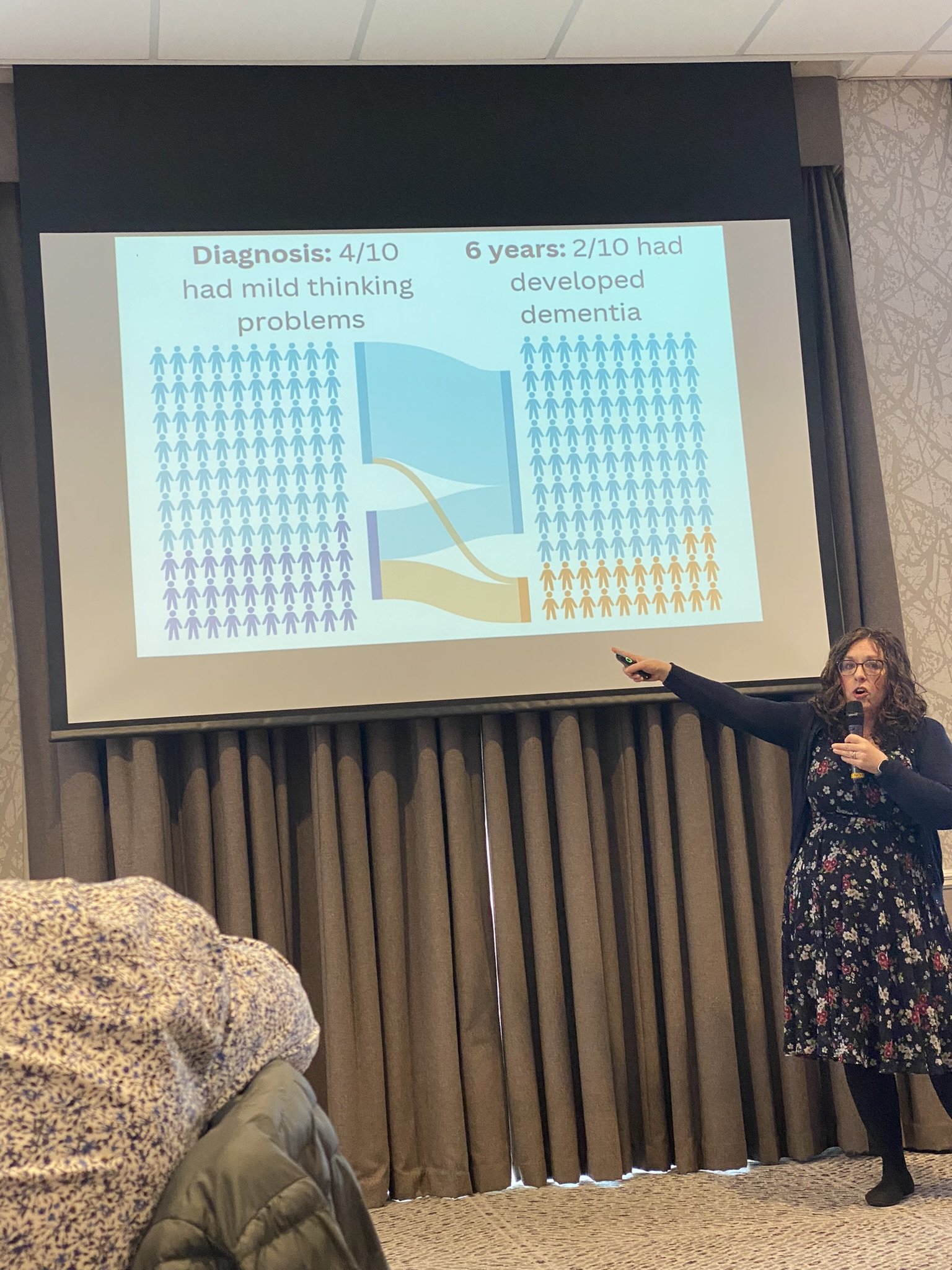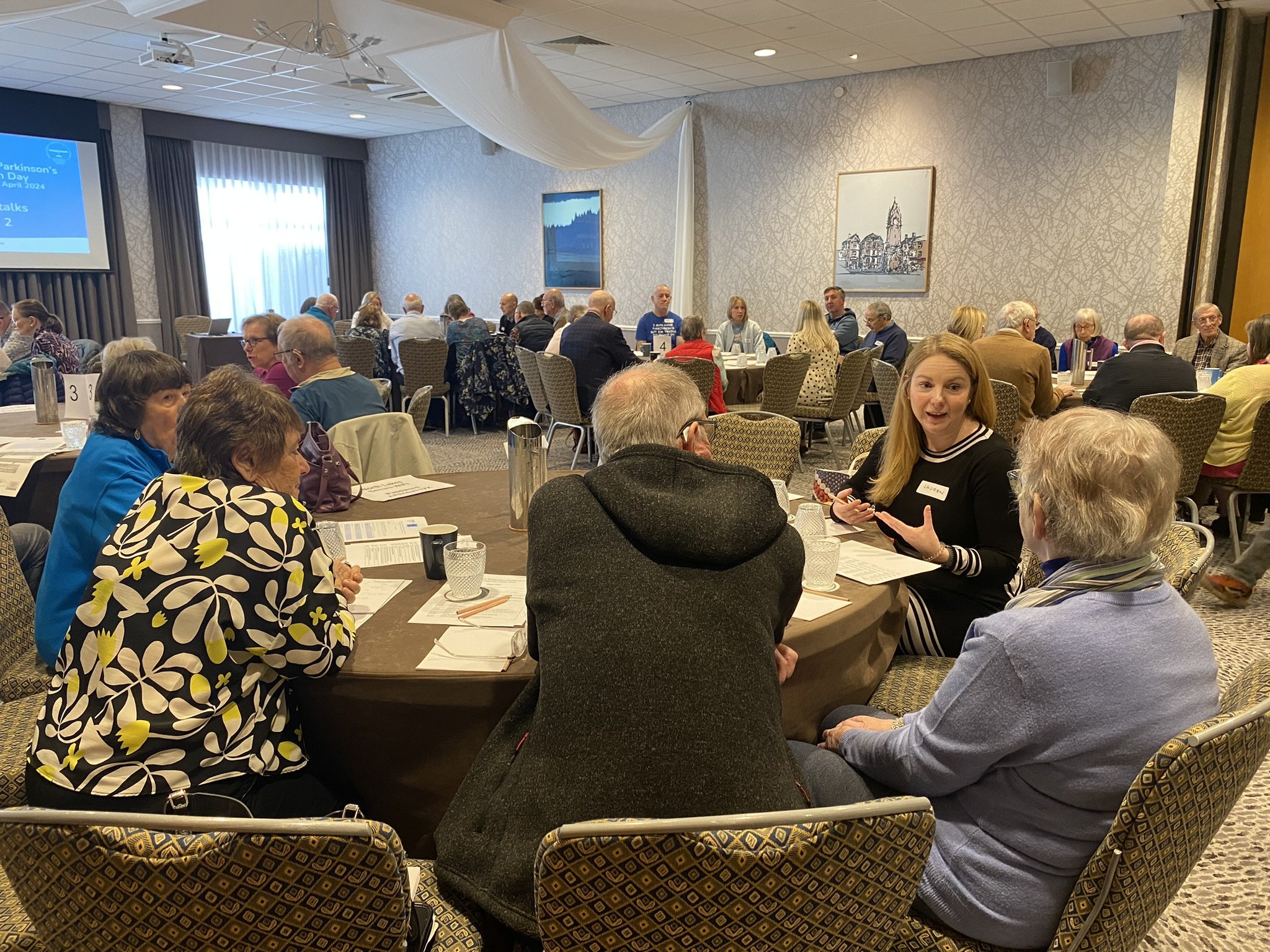Cumbria Parkinson’s Research Day
Parkinson’s Research + Engagement: Diagnosis and Beyond
We would like to send out heartfelt thanks to all those researchers, organisers and participants who helped to make the Research event at the North Lakes Hotel in Penrith in April such a wonderful success. Alan Ellis and the West Cumbria Branch have kindly summarised this excellent day.
Welcome to all was given by Cara Connolly, Parkinson's area Development Manager.
Dr Rachael Lawson gave a wonderful keynote speech to set the tone for the theme for the day Early detection of cognitive impairment in Parkinson's from diagnosis and beyond.
The talk highlighted how this can develop at varying degrees overtime. Rachael described a study looking at testing in different areas including concentration, memory and language. Alongside these tests PET scans and or MRI scans are used to see what is happening in the brain. Findings show how people may need more help and how many patients in hospital with Parkinson's have delirium which runs a risk of going undetected.
For the remainder of the day speakers came around each table to inform us of their projects:
Accelerating Research Breakthroughs by Professor David Dexter, Director of Research, Parkinson's UK
We in the UK were the highest spending country in Europe with some £830 - 40 million this last spent on research this year. This is reflected in the higher number of studies that are carried out in the UK compared with the other parts of Europe, with ever promising results.
Research Opportunities and Recruiting Studies in Cumbria by Gillian Webster, North Cumbria Integrated Care NHS Foundation Trust
Gillian explained how a drug a "Ambroxel" may help to slowdown or flat line the progress of Parkinson's and handed out some information if people were interested to find out more. She also discussed the Parkinson's Family Project, a National Study, wanting details of current, family descendants who had or may have had Parkinson’s to build up a genealogic picture of a family, to interpret if any links from the past can be projected forward into future generations.
How Music can Improve Walking for People with Parkinson's by Dr Frances Sapsford, Cumbria University
Frances described a study looking at walking with or without music, 170 people took part, majority found improvement in walking by listening to music. It is suggested that the rhythm activates parts of the brain not possibly used in other aspects of movement.
The Roll of the Parkinson's Nurse Specialist by Sarah Johnstone, North Cumbria Integrated Care NHS Foundation Trust
Described as an ‘asset’ to the service and now well on the way to be qualified to be able to prescribe medication. With the increase in current staff levels patients are being seen on a more regular basis, three to four months between appointments between the doctor and nurse. With the information we have at present about seven to eight hundred people in North Cumbria have Parkinson's and work is ongoing to provide a service to meet this need.
After a much needed break for lunch Dr Ailish O’Callaghan gave the second keynote talk of the day, Updates in North Cumbria. She highlighted the role of advancing therapies, some of which need to be "tertiary agreed" from Newcastle. Cumbria is working hard to develop staff training opportunities to provide more services ‘in house’ where appropriate. Dr O’Callaghan also discussed why research is dealt within the UK in different ways. Studies can be studied in one local area or regional or nationally. Ways of combating challenges of managing Parkinson’s during hospital admission highlighted, electronic prescribing is being rolled out across all North Cumbria hospital sites and this can be audited to better understand the problems with medication administration while in hospital.
Brain Changes in People with Parkinson's by Dr Lauren Walker, Newcastle University: The nearest Brain Bank is in Newcastle there are several centres in the UK, (these are not the same as the Parkinson's Brain Bank in London).
Brains when donated are used to determine, for example which proteins have developed and ‘stick together’ giving rise to disease. Microscopes are being developed to be able to give diagnoses quicker. Brains donated in the 1970's are still being used, due to new technologies developed in recent years.
Using Technology to Remotely Personalise Your Medication by Emma Parker, Brain Movement Research Group, Newcastle University
Digital devices were demonstrated looking at prompting for medication and recording walking movements such as speed step length, over longer and shorted bouts of walking. Motor fluctuations and dyskinesia are monitored. Eventually data will be collected for seven days, create a plan for the individual person. Data will be able to detect all movements e.g. medication, waking, sleeping etc. Data has been collected, is now being analysed, results should be ready in about two years.
Rest Table/Q&A hosted by Dr Rosie Varden, North Cumbria Integrated Care NHS Trust
Rosie discussed her prevalence work, ongoing work looking at postcode data and movements of people within the region to determine if there any ‘hotspot’ patterns of disease which may have an environmental or genetic component.
Closing Remarks, by Tracy Westgarth and Cara Connolly: Thanked their teams of workers for all their work in enabling this event to be staged. Thanks, must also go to the speakers who have enlightened us with their work, the hotel for their hospitality. Special thanks to both Carlisle and West Cumbria Branches for funding this event.
Cumbria Parkinson’s Research Day
Parkinson’s Research + Engagement: Diagnosis and Beyond
Thursday 25th April | The Lakes Hotel, Penrith
Written by Alan Ellis and the West Cumbria Branch













